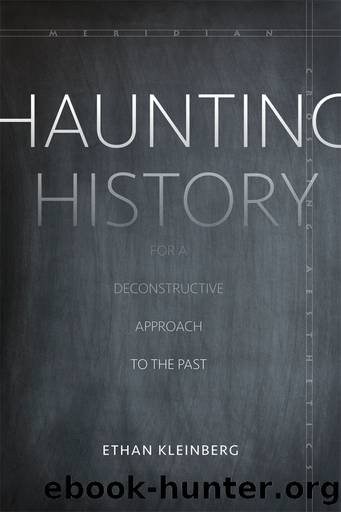Haunting History by Kleinberg Ethan

Author:Kleinberg, Ethan [Kleinberg, Ethan]
Language: eng
Format: epub
Publisher: Stanford University Press
Published: 2017-07-14T16:00:00+00:00
§ 4 The Analog Ceiling
I want to revisit the story by Kafka about the Great Wall of China from the previous chapter to focus on another, related, aspect of Kafka’s tale: the fable of the “imperial message” embedded into the heart of the story where the message is received, if it ever could be received at all, only after the emperor is dead and a new emperor, presumably with a new message, has been installed. The narrator tells us:
Just so, as hopelessly and as hopefully, do our people regard the Emperor. They do not know what Emperor is reigning, and there exists doubts regarding the name of the dynasty. In school a great deal is taught about the dynasties with the dates of succession, but the universal uncertainty in this matter is so great that even our best scholars are drawn into it. Long-dead emperors are set on the throne in our villages, and the one that only lives on in song recently had a proclamation of his read out by the priest before the altar. Battles that are old history are new to us, and one’s neighbor rushes in with a jubilant face to tell the news.1
I can’t speak for certain about the situation in other regions of the world, but it strikes me that this passage is a perfect description of the current state of historical methodology in most American history departments.2 Long-dead methods of, and assumptions about, historical inquiry are set on the thrones in our history departments and libraries, and one that only lives on in song recently had its virtues extolled by the president of the American Historical Association. Battles that are old history are new to them, and one’s colleague rushes into the department meeting with a jubilant face to tell the news of the death of “historical theory.”
The emperor has a name, “ontological realism,” although there is “universal uncertainty” about whether this is the dynasty of empiricism, neopositivism, ontological materialism, or historical realism. As previously discussed, what I mean by “ontological realism” is a commitment to history as an endeavor concerned with events assigned to a specific location in space and time that are in principle observable and as such are regarded as fixed and immutable. Central to this position is a commitment to empirical data that serves as something of a false floor to hold it up. Hayden White argued in 1976 that this “empiricist prejudice is attended by a conviction that ‘reality’ is not only perceivable but is also coherent in its structure,”3 and in a recent review on an anthology of essays by White, Paul Roth explains that “whether discrete or extended, events within a realist conception of history constitute the stuff of true chronicles, so they form an analog to an empiricist’s foundational data on which to build historical knowledge/representation. But as goes the notion of singular statements or simple descriptions that have their own determinative truth conditions, so goes the conception of events as an untheorized given that supports realist representation.
Download
This site does not store any files on its server. We only index and link to content provided by other sites. Please contact the content providers to delete copyright contents if any and email us, we'll remove relevant links or contents immediately.
| Books & Reading | Comparative Literature |
| Criticism & Theory | Genres & Styles |
| Movements & Periods | Reference |
| Regional & Cultural | Women Authors |
4 3 2 1: A Novel by Paul Auster(11035)
The handmaid's tale by Margaret Atwood(6838)
Giovanni's Room by James Baldwin(5873)
Big Magic: Creative Living Beyond Fear by Elizabeth Gilbert(4719)
Asking the Right Questions: A Guide to Critical Thinking by M. Neil Browne & Stuart M. Keeley(4567)
On Writing A Memoir of the Craft by Stephen King(4206)
Ego Is the Enemy by Ryan Holiday(3982)
Ken Follett - World without end by Ken Follett(3968)
The Body: A Guide for Occupants by Bill Bryson(3791)
Bluets by Maggie Nelson(3705)
Adulting by Kelly Williams Brown(3663)
Guilty Pleasures by Laurell K Hamilton(3578)
Eat That Frog! by Brian Tracy(3509)
White Noise - A Novel by Don DeLillo(3430)
The Poetry of Pablo Neruda by Pablo Neruda(3358)
Alive: The Story of the Andes Survivors by Piers Paul Read(3304)
The Bookshop by Penelope Fitzgerald(3222)
The Book of Joy by Dalai Lama(3212)
Fingerprints of the Gods by Graham Hancock(3207)
